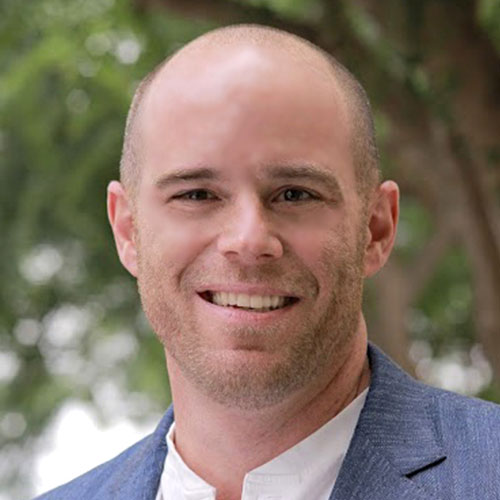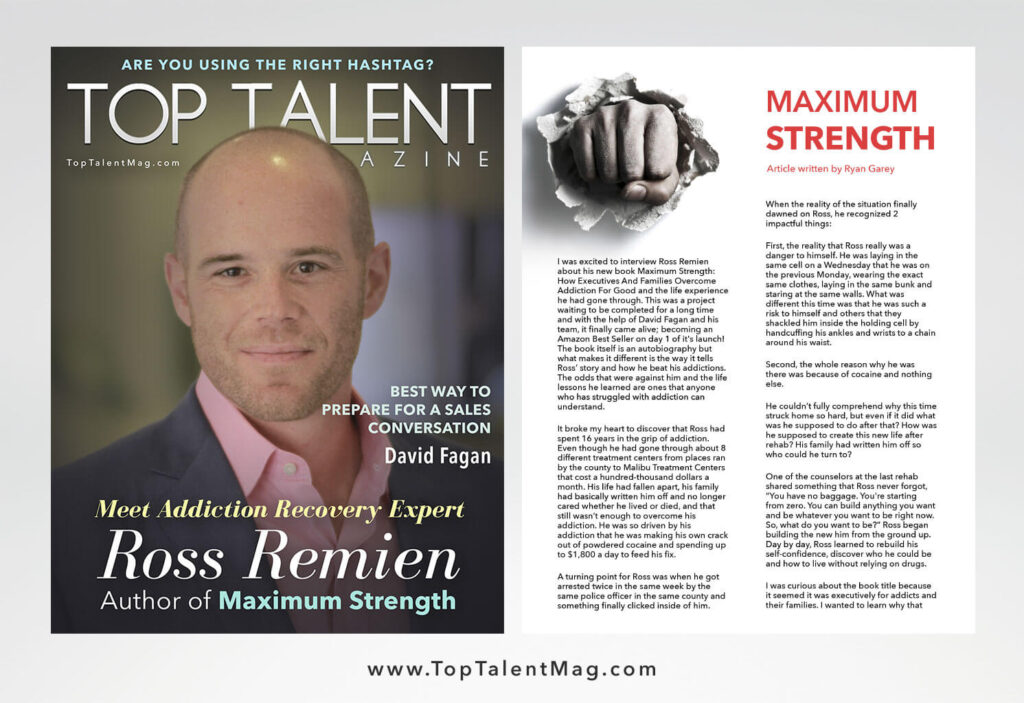I was excited to interview Ross Remien about his new book Maximum Strength: How Executives And Families Overcome Addiction For Good and the life experience he had gone through. This was a project waiting to be completed for a long time and with the help of David Fagan and his team, it finally came alive; becoming an Amazon Best Seller on day 1 of it’s launch! The book itself is an autobiography but what makes it different is the way it tells Ross’ story and how he beat his addictions. The odds that were against him and the life lessons he learned are ones that anyone who has struggled with addiction can understand.
It broke my heart to discover that Ross had spent 16 years in the grip of addiction. Even though he had gone through about 8 different treatment centers from places ran by the county to Malibu Treatment Centers that cost a hundred-thousand dollars a month. His life had fallen apart, his family had basically written him off and no longer cared whether he lived or died, and that still wasn’t enough to overcome his addiction. He was so driven by his addiction that he was making his own crack out of powdered cocaine and spending up to $1,800 a day to feed his fix.
A turning point for Ross was when he got arrested twice in the same week by the same police officer in the same county and something finally clicked inside of him. When the reality of the situation finally dawned on Ross, he recognized 2 impactful things:
First, the reality that Ross really was a danger to himself. He was laying in the same cell on a Wednesday that he was on the previous Monday, wearing the exact same clothes, laying in the same bunk and staring at the same walls. What was different this time was that he was such a risk to himself and others that they shackled him inside the holding cell by handcuffing his ankles and wrists to a chain around his waist.
Second, the whole reason why he was there was because of cocaine and nothing else.
He couldn’t fully comprehend why this time struck home so hard, but even if it did what was he supposed to do after that? How was he supposed to create this new life after rehab? His family had written him off so who could he turn to?
One of the counselors at the last rehab shared something that Ross never forgot, “You have no baggage. You’re starting from zero. You can build anything you want and be whatever you want to be right now. So, what do you want to be?” Ross began building the new him from the ground up. Day by day, Ross learned to rebuild his self-confidence, discover who he could be and how to live without relying on drugs.
I was curious about the book title because it seemed it was executively for addicts and their families. I wanted to learn why that was. Ross clarified by giving me a few of the reasons:
First, while these lessons apply to everyone, Ross found that most of his clients were fortune 500, fortune 50 people. When talking with people on that level it can be difficult to breakthrough and help them see that their favorite pass time was becoming detrimental. At that level they can be under immense pressure on a daily basis which was something Ross grew to understand running his own business… even if they don’t have challenges with drugs or alcohol.
Second, the trauma addiction afflicts on the individual is only comparable to the damage it afflicts on their family members. Ross wrote this book because he wanted a mother, father, husband, wife and child to understand what their loved one was going through and understand how they can better help them.
Third, because addiction is literally an epidemic. Addiction is a crisis that everyone needs to wake up to even when including the best treatments around the world, the addiction treatment industry only has a 5% success rate. That means a 95% failure rate, which is going on right now. That’s what Maximum Strength does; it shines a light on this epidemic in a way that anyone can see.
When Ross finally got sober, the last center he was in gave me a job about two months into the three months stay there. At the end of the 90-days and not sure what he could do to start his new life, Ross became a landscaper and started cutting the lawn for the treatment center he just went through.
He did that for a year before slowly working his way up through the chain of this treatment center and held different leadership positions at the treatment center. What followed was he went to school at UCLA and became a chemical dependency counselor, got a certificate in chemical dependency counseling and after about five years of doing a lot of one-on-one treatment and leading groups Ross started to gain a lot of experience and recognition for his efforts.
After going through this massive transformation, Ross decided to get out of the business on that level and closed on one of the treatment centers just because it couldn’t be sold and the other and he ended up selling because the industry is literally collapsing in on itself and going through major changes after Obamacare.
Ross is so passionate about the importance of this book because one of the final straws that broke the proverbial “camel’s back” was when an insurance company told Ross that this one girl in particular didn’t qualify for detox because she didn’t do enough heroin. She died two days later. Her tale is one of many heartbreaking stories. Despite his tremendous success rate, Ross was averaging over three people a week dying just from overdoses. He made the profound decision to do things differently, write his book, share his story, and work to change the system at a bigger level.
A couple golden nugget to walk away with from this interview are:
First, learn to drive yourself! That means learning to accept yourself as you are now and commit to taking better care of yourself. Even after getting clean, certain things I still didn’t do well. One thing is I didn’t do is look at my success and give myself enough credit for it.
Second, honesty. Day one of getting sober is to be honest with yourself and everyone else.
To see the full edition, go to this link:

Ross Remien
Life Coach
Ross Remien is a Chemical Dependency Counselor and life coach with over 10 years of experience in the field of addiction. He opened Rebos Treatment Center in Los Angeles six years ago, which is now one of the most renowned outpatient treatment centers in the country.


